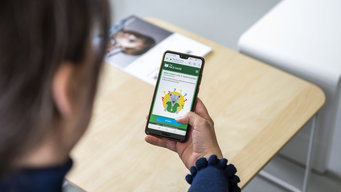Artificial intelligence to show its face
The Face Game is a new online experiment that explores how chatbots will choose to appear to humans
As AI personas make their way into social media, have you ever wondered how they will create their own profile pictures? The Face Game is a research project that lets people and AI interact, helping us see how AI might choose its own face depending on its objectives and the people it interacts with. This multidisciplinary project will help us navigate the future of digital interactions with AI.

Online, profile pictures of human faces are everywhere, and they play a crucial role in shaping the first impression we make on others. Right now, AI gives people the digital tools to transform their online appearance in any way they desire, often making themselves look younger or more attractive. But this is just the beginning: AI is not only helping us play this face game amongst ourselves, but it is also learning the game from us and quietly deciding which face it will showcase as itself when interacting with us.
To better understand these mechanisms, researchers from the Max Planck Institute for Human Development, the Toulouse School of Economics, the University of Exeter, and the University of British Columbia, together with the Universidad Autonoma de Madrid and Université Paris Cité, have created and launched The Face Game. In this online experiment, humans mix up with neural networks, and everyone (including the machines), posts their own profile pictures and reacts to the profile pictures of others. The game aims at understanding how AI will learn to choose different types of faces for itself, depending on the impression it wants to make and the human it interacts with.
Seeking volunteers to play along
“As we increasingly come across AI replicants with self-generated faces, we need to understand what they learn from observing us play the face game and ensure that we retain control over how we interact with these digital entities,” says Iyad Rahwan, Director at the Center for Humans and Machines at the Max Planck Institute for Human Development. His research center explores ethical questions concerning AI and the concept of Machine Behavior.
In order for AI to give itself a face that best achieves its goals when interacting with a specific human, it needs to observe a lot of humans playing this game among themselves. “That means that we we face logistic challenges because we need a great many people to participate in the experiment, ideally from all over the world — we would not want our result to be narrowly focused on European faces, for example”, says Jean-Francois Bonnefon, research director at the Toulouse School of Economics and one of the project partners.
Who is looking like a team player?
This is how the game works: Once participants have logged in, they can begin playing rounds of the game, wherein they must mark the profile pictures of other players as “team”-looking or “solo”-looking. They get immediate feedback about the accuracy of their predictions.
Moreover, once they upload their profile pictures, participants get regularly updated statistics about how other players have reacted to them. They can experiment with different profile pictures to see which are rated more “team”- or more “solo”- looking. Finally, participants will encounter “replicants,” nonhuman players whose faces have been generated by state-of-the-art AI models continuously monitoring how human participants play the game.
This project comes from the research team that developed the Moral Machine, a massive online experiment that went viral in 2016. It explored the ethical dilemmas faced by autonomous vehicles, highlighting universal principles as well as cross-cultural differences in how people want AI to behave. The results were published in leading journals, including Science and Nature.
Developed by Universidad Autonoma de Madrid researchers, The Face Game operates on multimodal AI methods, including human behavior analysis with discrimination-aware machine learning and realistic synthetic face images.












